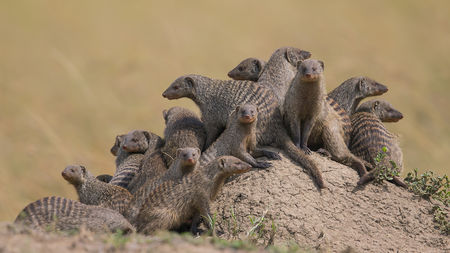
Mongoose mothers help their colonies thrive—by forgetting which pups are theirs
Pregnant mongooses in a colony all give birth on the same night, a phenomenon that makes it harder for mothers to know which pups are their own. But that confusion works in their favor—and may even lead to a fairer distribution of scarce resources—researchers report today in Nature Communications.
Working with seven groups of mongooses in Uganda, scientists from the University of Exeter and the University of Roehampton manipulated the birth weights of pups by giving some, but not all, of the pregnant mongooses extra food. After giving birth, the well-fed mothers doted on the smaller pups born to the underfed mongooses by feeding, carrying, protecting, and grooming them more often than their own, larger pups.
“We predicted that a ‘veil of ignorance’ would cause females to focus their care on the pups most in need” rather than their own offspring, Exeter evolutionary biologist Michael Cant said in a press release. In doing so, he adds, mongoose mothers minimize the risk that their future offspring could one day face a disadvantage—while evening the playing field for the whole colony.








 个人中心
个人中心 我的培训班
我的培训班 反馈
反馈












Comments
Something to say?
Log in or Sign up for free